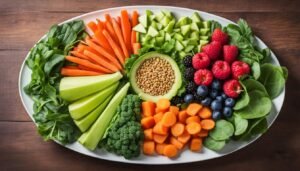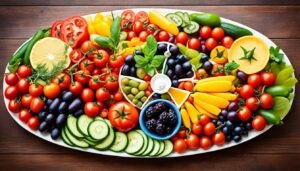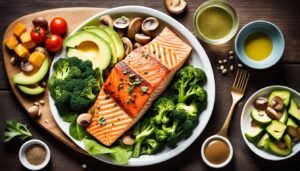Get our FREE E-Book HERE - 120 TIPS for Losing Weight & Bonus Tips for Postpartum Weight Loss & Dad’s Postpartum Experience
4 Health Benefits you didn’t know about The Pescatarian Diet

Introduction

The Pescatarian diet is a plant-based diet with the inclusion of fish and other seafood. It offers the advantages of vegetarianism without completely eliminating animal proteins. Some choose this diet for health benefits, while others do so for ethical or environmental reasons.
What is the Pescatarian Diet?
In essence, the Pescatarian diet primarily consists of fruits, vegetables, grains, legumes, and seafood. It omits red meat, poultry, and other land animals but occasionally includes eggs and dairy.
Origins
The term “pescatarian” is relatively new, though the diet itself has existed for centuries, rooted in various cultures with abundant access to fresh seafood.
Health Benefits
- Heart Health: Seafood is rich in Omega-3 fatty acids that are known to improve heart health. A study published in the Journal of the American Medical Association (JAMA) suggests that higher fish consumption is associated with lower rates of fatal heart issues [1].
- Nutrient-rich: Fish and shellfish are packed with protein, vitamins, and minerals like iodine, zinc, and selenium.
- Weight Management: Studies suggest that a pescatarian diet may help in weight loss due to its low saturated fat content [2].
- Reduced Cancer Risk: A plant-based diet rich in antioxidants can lower the risk of certain cancers, according to a study published in the American Journal of Clinical Nutrition [3].
What Can You Eat?
- Fish: Salmon, Tuna, Mackerel, Sardines, etc.
- Shellfish: Shrimp, Crab, Lobster, Oysters, etc.
- Plant-based Foods: All kinds of fruits, vegetables, grains, and legumes.
- Dairy and Eggs: Optional and should be consumed in moderation.

What to Avoid?
- Red Meat: Beef, lamb, pork, etc.
- Poultry: Chicken, turkey, duck, etc.
Sample Meal Plan
Day 1:
- Breakfast: Overnight oats with almond milk and blueberries
- Lunch: Tuna salad
- Dinner: Grilled salmon with steamed veggies
Sustainability and Ethical Concerns
The ethics of fishing are debated, especially when it comes to overfishing and fish farming practices. Choose sustainably sourced fish to minimize your environmental impact.
Nutritional Concerns and Precautions
- Mercury Levels: Some types of fish can be high in mercury. The FDA provides a guideline on fish consumption, particularly for pregnant women [4].
- Nutrient Deficiency: A lack of red meat might lead to iron deficiency. Ensure a balanced diet rich in alternative iron sources like legumes and fortified cereals.
How to Get Started
- Consult a Healthcare Provider: Before making any drastic dietary changes.
- Plan Your Meals: Meal planning can make the transition easier.
- Grocery Shopping: Stock up on pescatarian-friendly foods.
- Mindful Eating: Pay attention to how your body reacts to the new diet.

Conclusion
The Pescatarian diet offers a flexible, nutrient-rich way to improve your health while potentially aiding in weight loss and reducing disease risk. However, it’s crucial to source your fish sustainably and balance out your meals to avoid nutritional deficiencies.
References
Don’t forget to check out our free tools, the BMI calculator and our Optimal Calories Calculator








